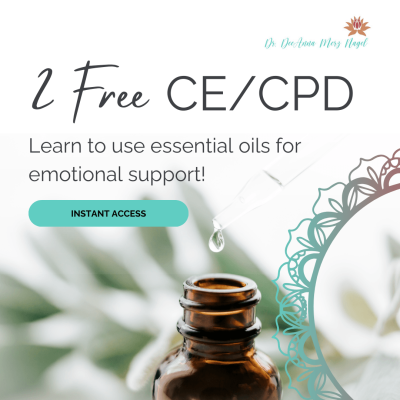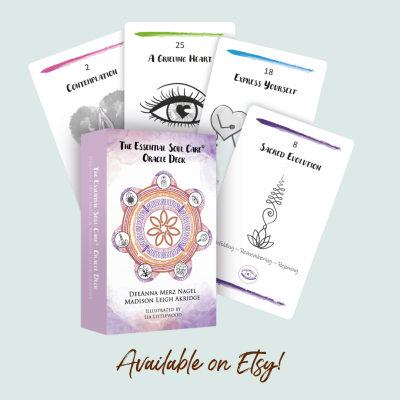UPCOMING BOOK: CALL FOR CHAPTER AUTHORS!
Case Studies in Aromatherapy: Enhancing Mental Health and Well-Being
Authored & Edited Books
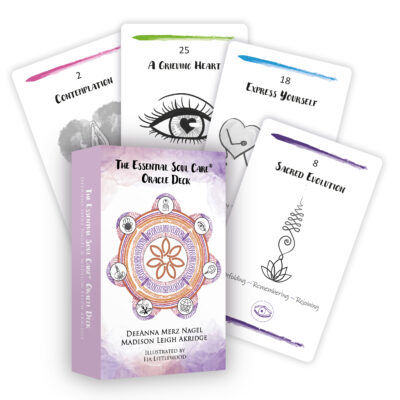 The Essential Soul Care Oracle Deck and Guidebook (2nd Ed) This 49-card deck and 130-page companion guidebook allows you to truly engage in soul play and soul study so that you can live your most expansive life. Through channeled messages and monochrome artwork, explore the seven elements of Essential Soul Care: Transcendence, Intuition, Mindset, Community, Nourishment, Creativity, and Sanctuary. Each element corresponds to one of the 7 primary chakras. Engage with the Oracle’s message using complementary tools such as chakra mantras, affirmations, contemplative writing, crystals, and essential oils. In combination, the deck and guidebook can be used as a powerful tool for therapists, coaches, and healers who want to weave in a psychospiritual approach with clients.
The Essential Soul Care Oracle Deck and Guidebook (2nd Ed) This 49-card deck and 130-page companion guidebook allows you to truly engage in soul play and soul study so that you can live your most expansive life. Through channeled messages and monochrome artwork, explore the seven elements of Essential Soul Care: Transcendence, Intuition, Mindset, Community, Nourishment, Creativity, and Sanctuary. Each element corresponds to one of the 7 primary chakras. Engage with the Oracle’s message using complementary tools such as chakra mantras, affirmations, contemplative writing, crystals, and essential oils. In combination, the deck and guidebook can be used as a powerful tool for therapists, coaches, and healers who want to weave in a psychospiritual approach with clients.
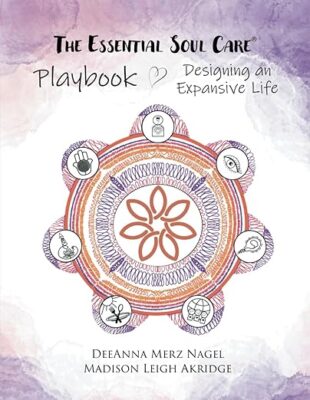 The Essential Soul Care Playbook: Designing an Expansive Life (2nd Ed) (2023) dives deep into the 7 elements of Essential Soul Care and the 7 primary chakras. Each element is paired with a chakra and explored to give the reader a broad scope that can be applied to one’s daily life. Additional tools are paired, including essential oils, crystal stones, affirmations and journal prompts. Practical and spiritual applications are offered. Chapter by chapter, we illuminate how these new understandings can help you design your most expansive life.
The Essential Soul Care Playbook: Designing an Expansive Life (2nd Ed) (2023) dives deep into the 7 elements of Essential Soul Care and the 7 primary chakras. Each element is paired with a chakra and explored to give the reader a broad scope that can be applied to one’s daily life. Additional tools are paired, including essential oils, crystal stones, affirmations and journal prompts. Practical and spiritual applications are offered. Chapter by chapter, we illuminate how these new understandings can help you design your most expansive life.
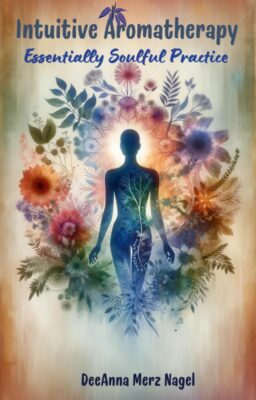 Intuitive Aromatherapy: Essentially Soulful Practice (2024). Drawing on years of experience as a psychotherapist, coach, and energy healer, the author presents Intuitive Aromatherapy, a book that seamlessly integrates her expertise with a deep appreciation for essential oils. This book introduces accessible methods for incorporating essential oils into daily routines to promote overall well-being, encompassing spiritual, emotional, and physical harmony. Its diverse topics range from chakra balancing and trauma healing to practical aromatherapy tips for everyday use and ways to enhance connections with soul mates or twin flames. Above all, the book explores how essential oils serve as a tangible expression of intuition and spirit.
Intuitive Aromatherapy: Essentially Soulful Practice (2024). Drawing on years of experience as a psychotherapist, coach, and energy healer, the author presents Intuitive Aromatherapy, a book that seamlessly integrates her expertise with a deep appreciation for essential oils. This book introduces accessible methods for incorporating essential oils into daily routines to promote overall well-being, encompassing spiritual, emotional, and physical harmony. Its diverse topics range from chakra balancing and trauma healing to practical aromatherapy tips for everyday use and ways to enhance connections with soul mates or twin flames. Above all, the book explores how essential oils serve as a tangible expression of intuition and spirit.
.
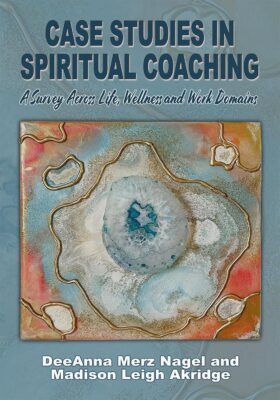 Case Studies in Spiritual Coaching: A Survey Across Life, Wellness, and Work Domains (2023) addresses a major problem in teaching and informing practitioners and trainees about the application of spirituality within the field of coaching. Its purpose is to inform the coaching profession about how spirituality is being utilized by various coaches across the life, wellness, and executive coach domains. The goals are to provide definitions, applications, ethical considerations, and speculation on the future of the profession on a wide range of applications. The content of the book is a succinct series of case studies while providing cutting-edge tools and interventions for the coaching profession.
Case Studies in Spiritual Coaching: A Survey Across Life, Wellness, and Work Domains (2023) addresses a major problem in teaching and informing practitioners and trainees about the application of spirituality within the field of coaching. Its purpose is to inform the coaching profession about how spirituality is being utilized by various coaches across the life, wellness, and executive coach domains. The goals are to provide definitions, applications, ethical considerations, and speculation on the future of the profession on a wide range of applications. The content of the book is a succinct series of case studies while providing cutting-edge tools and interventions for the coaching profession.
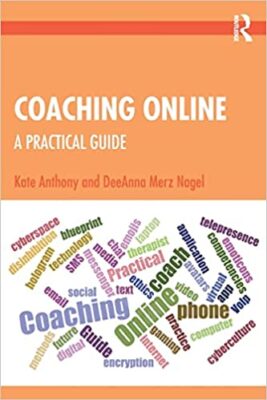 Coaching Online: A Practical Guide (2021) Translating traditional coaching methods and competencies for use in the online world, this informative and timely guide shows coaches how to transform their face-to-face practice into one that utilizes technological means of communication with clients, mentors, and everyone else associated with their practice. The book offers up-to-the-minute practical and ethical information from two world-expert coaches, leaning on their combined 50 years of experience and study. It covers the practice of online coaching via email, chat, audio/telephone and video methods, as well as the ethics of online coaching (including an ethical framework), case material, supervision, mentoring and training, and a look into the future of the coaching profession in light of technological developments and the culture of cyberspace.
Coaching Online: A Practical Guide (2021) Translating traditional coaching methods and competencies for use in the online world, this informative and timely guide shows coaches how to transform their face-to-face practice into one that utilizes technological means of communication with clients, mentors, and everyone else associated with their practice. The book offers up-to-the-minute practical and ethical information from two world-expert coaches, leaning on their combined 50 years of experience and study. It covers the practice of online coaching via email, chat, audio/telephone and video methods, as well as the ethics of online coaching (including an ethical framework), case material, supervision, mentoring and training, and a look into the future of the coaching profession in light of technological developments and the culture of cyberspace.
.
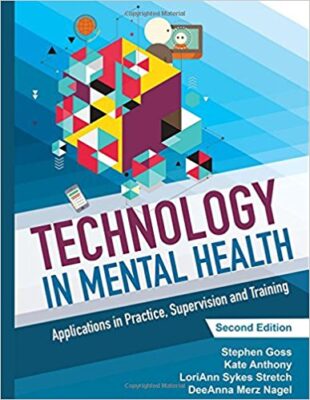 Technology in Mental Health: Applications in Practice, Supervision and Training (2nd Ed) (2016) In the half decade since publication of the first edition, there have been significant changes in society brought about by the exploding rise of technology in everyday lives that also have an impact on our mental health. The most important of these has been the shift in the way human interaction itself is conducted, especially with electronic textbased exchanges. This expanded second edition is an extensive body of work. It contains 39 chapters on different aspects of technological innovation in mental health care from 54 expert contributors from all over the globe, appropriate for a subject that holds such promise for a worldwide clientele and that applies to professionals in every country.
Technology in Mental Health: Applications in Practice, Supervision and Training (2nd Ed) (2016) In the half decade since publication of the first edition, there have been significant changes in society brought about by the exploding rise of technology in everyday lives that also have an impact on our mental health. The most important of these has been the shift in the way human interaction itself is conducted, especially with electronic textbased exchanges. This expanded second edition is an extensive body of work. It contains 39 chapters on different aspects of technological innovation in mental health care from 54 expert contributors from all over the globe, appropriate for a subject that holds such promise for a worldwide clientele and that applies to professionals in every country.
.
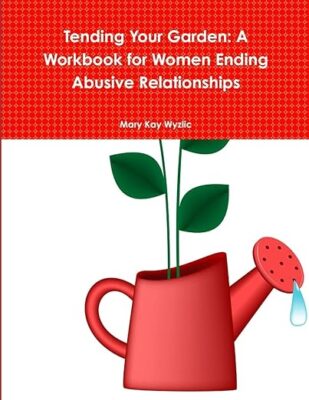 Tending Your Garden: A Workbook for Women Ending Abusive Relationships (2013) As told by Mary Kay Wyzlic, author: This book is the result of my struggle. I set out to put into words, as best I could, what I would tell a friend who was coming out of an abusive relationship. Please accept this invitation to walk with me along some winding paths of self-discovery. As you begin, think of your life as a garden, and yourself as the master gardener. You have three important tasks: weeding, cultivating and planting. All of them are things you must do to create healthy new blooms that will last. Edited by Nagel & Anthony, Online Therapy Institute.
Tending Your Garden: A Workbook for Women Ending Abusive Relationships (2013) As told by Mary Kay Wyzlic, author: This book is the result of my struggle. I set out to put into words, as best I could, what I would tell a friend who was coming out of an abusive relationship. Please accept this invitation to walk with me along some winding paths of self-discovery. As you begin, think of your life as a garden, and yourself as the master gardener. You have three important tasks: weeding, cultivating and planting. All of them are things you must do to create healthy new blooms that will last. Edited by Nagel & Anthony, Online Therapy Institute.
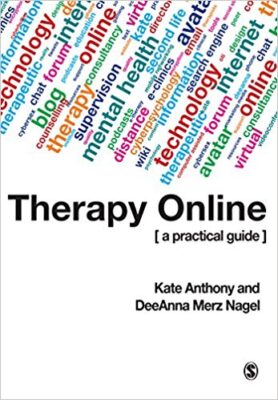 Therapy Online [A Practical Guide] (2010) The plethora of online services now available has led to a growing demand for practitioners to look beyond traditional face-to-face therapy and take advantage of the flexibility which email and the Internet can offer them and their clients. This guide gives up-to-the minute information and research, ethical and legal advice, on the practicalities of setting up or joining a service, and the essential therapeutic skills needed to be an effective online therapist.
Therapy Online [A Practical Guide] (2010) The plethora of online services now available has led to a growing demand for practitioners to look beyond traditional face-to-face therapy and take advantage of the flexibility which email and the Internet can offer them and their clients. This guide gives up-to-the minute information and research, ethical and legal advice, on the practicalities of setting up or joining a service, and the essential therapeutic skills needed to be an effective online therapist.
.
Chapter/Essay Contributions to Books
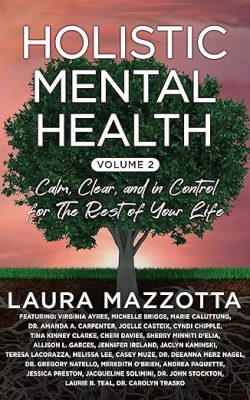
Holistic Mental Health—Calm, Clear, and In Control for the Rest of Your Life Vol 2 (2024). This book expands and redefines the topic of holistic mental health in a deeper, more effective way. With a powerful collection of profound stories, each author is a trailblazer for courage and authenticity. They generously share a practical strategy for the reader and guide your path with compassion, wisdom, and knowledge to help you feel calm, clear, and in control for the rest of your life. 25 authors come together telling their own unique and profound stories while offering tools for anyone interested in optimizing their mental health. Dr. Nagel’s chapter: Therapeutic aromatics: Level up your intuition with contemplative writing and essential oils!
Amazon Best Seller!
 Sovereign Soul: Understanding Twin Flames is available on Etsy! This 60-page book of essays is filled with sage, wise advice from a licensed therapist and certified life coach who teaches by reflecting on her own journey. Feeling sovereign and whole through the Twin Flame journey is what is most important. Take charge of your experience. Become more focused. Understand the purpose. Be empowered! DeeAnna shares this e-book with you as it brings together her most prominent thoughts and feelings around understanding the Twin Flame phenomenon.
Sovereign Soul: Understanding Twin Flames is available on Etsy! This 60-page book of essays is filled with sage, wise advice from a licensed therapist and certified life coach who teaches by reflecting on her own journey. Feeling sovereign and whole through the Twin Flame journey is what is most important. Take charge of your experience. Become more focused. Understand the purpose. Be empowered! DeeAnna shares this e-book with you as it brings together her most prominent thoughts and feelings around understanding the Twin Flame phenomenon.
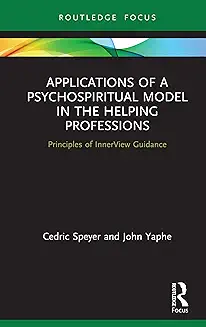 Nagel, D.M. (2021). InnerView applied to intuitive wellness coaching. In C. Speyer & J. Yaphe (Eds.) Applications of a Psychospiritual Model in the Helping Professions: Principles of InnerView Guidance (pp.91-93). Routledge: NY, NY. This book brings together the historically separate domains of mental health and spiritual awareness in a holistic framework called InnerView Guidance. Building on strength-based and solution-oriented approaches to therapy, the InnerView model offers a unique psychospiritual approach which can be applied in any of the helping professions.
Nagel, D.M. (2021). InnerView applied to intuitive wellness coaching. In C. Speyer & J. Yaphe (Eds.) Applications of a Psychospiritual Model in the Helping Professions: Principles of InnerView Guidance (pp.91-93). Routledge: NY, NY. This book brings together the historically separate domains of mental health and spiritual awareness in a holistic framework called InnerView Guidance. Building on strength-based and solution-oriented approaches to therapy, the InnerView model offers a unique psychospiritual approach which can be applied in any of the helping professions.
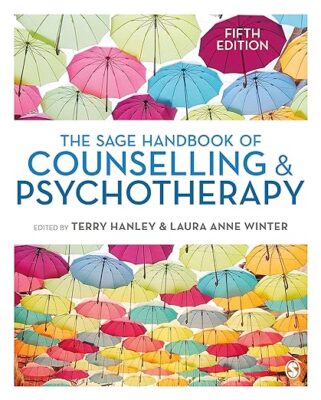 Goss, S., Nagel, D.M. & Anthony, K. (2023). Wider uses of technology in therapy. In Feltham, C. & Winter, L.A. (Eds.). The SAGE handbook of counselling and psychotherapy, (5th ed, pp.565-571). Sage: UK.- previously contributed to editions 3 & 4. Now updated to include the latest research and developments, and with new content on online counselling and working with difference and diversity, it is the most comprehensive and accessible guide to the field for trainees or experienced practitioners.
Goss, S., Nagel, D.M. & Anthony, K. (2023). Wider uses of technology in therapy. In Feltham, C. & Winter, L.A. (Eds.). The SAGE handbook of counselling and psychotherapy, (5th ed, pp.565-571). Sage: UK.- previously contributed to editions 3 & 4. Now updated to include the latest research and developments, and with new content on online counselling and working with difference and diversity, it is the most comprehensive and accessible guide to the field for trainees or experienced practitioners.
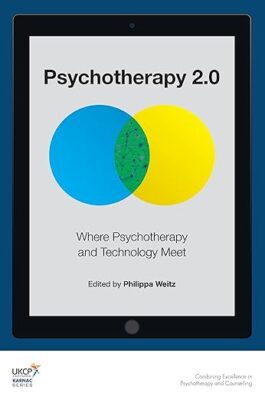 Anthony, K., & Nagel, D. (2014). Avatars—opening the virtual doors of therapy. In Psychotherapy 2.0 (pp. 133-145). Routledge: UK & Anthony, K., Goss, S. & Nagel, D.M. (2014). Developing Ethical Delivery of Cross-Border Services. In Weiss, P. (ed). Psychotherapy 2.0. (pp. 193-208), Routledge: UK. Psychotherapy 2.0 covers the key issues for psychotherapists and counsellors who are, or are thinking of, working online, include thinking about psychotherapy in the digital age, the requirements to modify training both for working online and also the digital issues as they arise within the face2face consulting room.
Anthony, K., & Nagel, D. (2014). Avatars—opening the virtual doors of therapy. In Psychotherapy 2.0 (pp. 133-145). Routledge: UK & Anthony, K., Goss, S. & Nagel, D.M. (2014). Developing Ethical Delivery of Cross-Border Services. In Weiss, P. (ed). Psychotherapy 2.0. (pp. 193-208), Routledge: UK. Psychotherapy 2.0 covers the key issues for psychotherapists and counsellors who are, or are thinking of, working online, include thinking about psychotherapy in the digital age, the requirements to modify training both for working online and also the digital issues as they arise within the face2face consulting room.
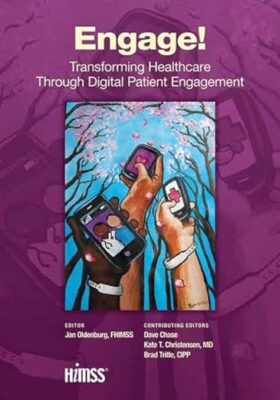 Nagel, D.M. (2013). Case Study 16: Online Therapy and Patient Engagement. Oldenburg, J., Chase, D., Christensen, K. T., & Tritle, B. (Eds.). Engage!: Transforming Healthcare Through Digital Patient Engagement. CRC Press. Before DeeAnna Nagel began practicing online therapy, and before she co-founded the Online Therapy Institute, she was a patient, and an e-patient.
Nagel, D.M. (2013). Case Study 16: Online Therapy and Patient Engagement. Oldenburg, J., Chase, D., Christensen, K. T., & Tritle, B. (Eds.). Engage!: Transforming Healthcare Through Digital Patient Engagement. CRC Press. Before DeeAnna Nagel began practicing online therapy, and before she co-founded the Online Therapy Institute, she was a patient, and an e-patient.
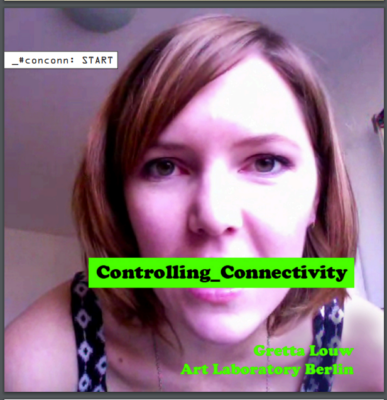 Nagel, D.M. (2012). Internet Addiction, Really?? In G. Louw Controlling_Connectivity: Art, Psychology and the Internet (pp.48-49).Limited Edition Artist’s Book: Art Laboratory Berlin. In her project Louw explores to what extent an extreme use of the Internet and our belief in the online connectivity can have psychological consequences.
Nagel, D.M. (2012). Internet Addiction, Really?? In G. Louw Controlling_Connectivity: Art, Psychology and the Internet (pp.48-49).Limited Edition Artist’s Book: Art Laboratory Berlin. In her project Louw explores to what extent an extreme use of the Internet and our belief in the online connectivity can have psychological consequences.
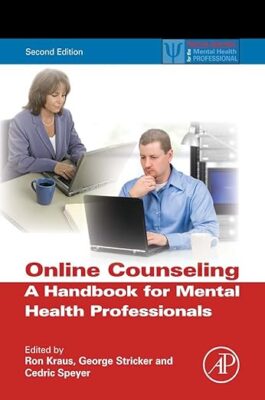 Nagel, D.M. & Anthony, K. (2010). Text-based Online Counseling: Chat. In R. Kraus, G. Stricker and C. Speyer (Eds.) Online counseling: A handbook for mental health professionals (2nd ed, 169-182). Academic Press: USA. The volume provides an overview of current research on the use and effectiveness of counseling online and data on the idiosyncrasies of online behavior and communication.
Nagel, D.M. & Anthony, K. (2010). Text-based Online Counseling: Chat. In R. Kraus, G. Stricker and C. Speyer (Eds.) Online counseling: A handbook for mental health professionals (2nd ed, 169-182). Academic Press: USA. The volume provides an overview of current research on the use and effectiveness of counseling online and data on the idiosyncrasies of online behavior and communication.
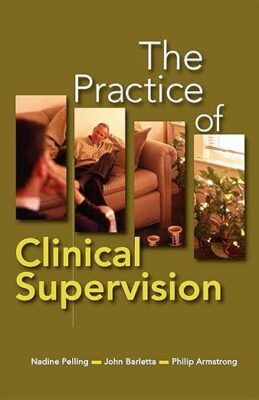 Nagel, D.M., Goss, S. & Anthony, K. (2009). The use of technology in supervision. In Pelling, N., Barletta, J & Armstrong, P. (Eds.) The practice of clinical supervision (pp.340-363). Australian Academic Press: Australia. The aim of this collaboration is to find a practical and appropriate process to support the counsellor in the workplace to achieve best practice in their everyday work.
Nagel, D.M., Goss, S. & Anthony, K. (2009). The use of technology in supervision. In Pelling, N., Barletta, J & Armstrong, P. (Eds.) The practice of clinical supervision (pp.340-363). Australian Academic Press: Australia. The aim of this collaboration is to find a practical and appropriate process to support the counsellor in the workplace to achieve best practice in their everyday work.
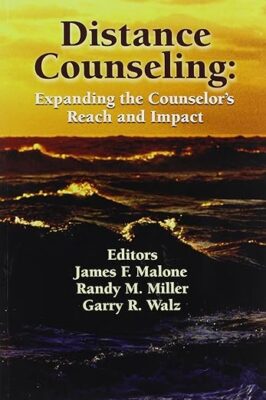 Nagel, D.M. (2007). Who can perform distance counseling? In J.F. Malone, R. M. Miller & G.R. Walz (Eds.), Distance counseling: Expanding the counselor’s reach and impact (pp. 44-52). Counseling Outfitters: Ann Arbor, MI. Written by highly experienced distance counseling specialists, this book comprehensively and authoritatively addresses the wide range of tasks involved in implementing distance counseling into traditional practice.
Nagel, D.M. (2007). Who can perform distance counseling? In J.F. Malone, R. M. Miller & G.R. Walz (Eds.), Distance counseling: Expanding the counselor’s reach and impact (pp. 44-52). Counseling Outfitters: Ann Arbor, MI. Written by highly experienced distance counseling specialists, this book comprehensively and authoritatively addresses the wide range of tasks involved in implementing distance counseling into traditional practice.
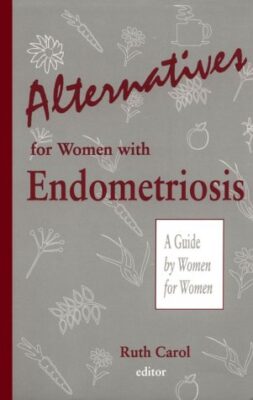 Merz, D.P. (1994). My personal health transformation. In R. Carol (Ed.) Alternatives for women with endometriosis: A guide for women by women (pp. 141-149). Third Side Press: Chicago, IL. Taking the mystery out of therapies like homeopathy, chiropractic, traditional Chinese medicine, nutritional therapy, and others. A dozen women diagnosed with endometriosis describe, in personal detail, their efforts — and successes — at finding relief.
Merz, D.P. (1994). My personal health transformation. In R. Carol (Ed.) Alternatives for women with endometriosis: A guide for women by women (pp. 141-149). Third Side Press: Chicago, IL. Taking the mystery out of therapies like homeopathy, chiropractic, traditional Chinese medicine, nutritional therapy, and others. A dozen women diagnosed with endometriosis describe, in personal detail, their efforts — and successes — at finding relief.
.



